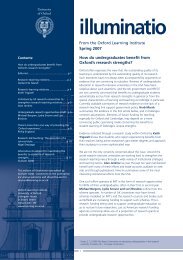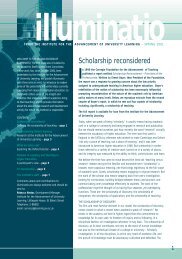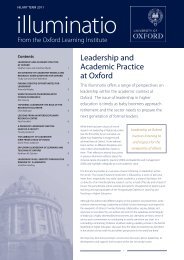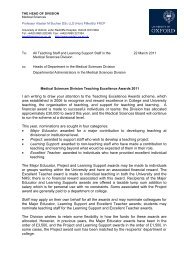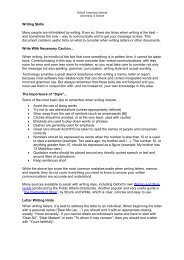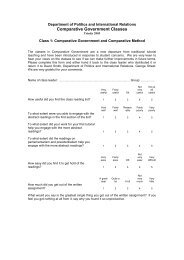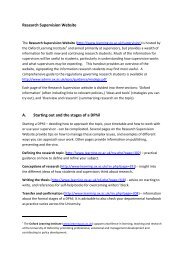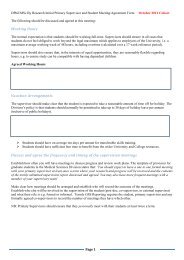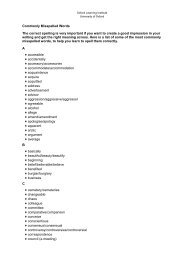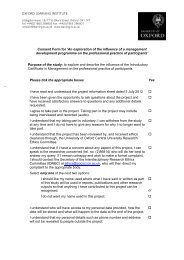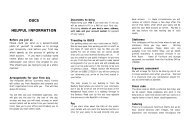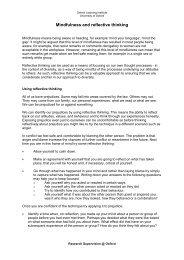Guidance notes for departments - Oxford Learning Institute ...
Guidance notes for departments - Oxford Learning Institute ...
Guidance notes for departments - Oxford Learning Institute ...
Create successful ePaper yourself
Turn your PDF publications into a flip-book with our unique Google optimized e-Paper software.
Ox<strong>for</strong>d <strong>Learning</strong> <strong>Institute</strong><br />
University of Ox<strong>for</strong>d<br />
When will PDR discussions be held<br />
4. The expectation is that PDR discussions are held annually. Departments are free to<br />
decide at which point in the year to schedule discussions:<br />
<br />
<br />
Some <strong>departments</strong> conduct PDRs at the same time each year, often during<br />
Trinity Term/the Long Vacation (this means the outcome of the discussions can<br />
be used, with the consent of the individual, as one piece of evidence to in<strong>for</strong>m<br />
merit review: see paragraph 10, below). Other <strong>departments</strong> hold PDRs<br />
immediately after the merit round, during Michaelmas Term. Holding all<br />
discussions at the same time simplifies the administration and monitoring of PDR<br />
and makes it easier to integrate the process with departmental planning and act<br />
on any outcomes of PDR at departmental level.<br />
Other <strong>departments</strong> hold PDRs on the anniversary of an individual‟s appointment<br />
to a post, so that discussions are scheduled throughout the year. This spreads<br />
the load <strong>for</strong> reviewers and rein<strong>for</strong>ces the focus on the individual, but makes it<br />
harder to link PDR with other departmental processes, and more difficult to<br />
collate and act on training and development or other needs at the level of the<br />
department. It also makes the administration and monitoring of the scheme more<br />
complex.<br />
How will the scheme be integrated with departmental planning processes<br />
5. PDR is intended to integrate planning to meet departmental and University objectives<br />
with review of individuals‟ per<strong>for</strong>mance and consideration of the support needed to<br />
achieve future objectives. It integrates a review of objectives set the previous year and<br />
the setting of new objectives <strong>for</strong> the coming year with an opportunity to discuss<br />
individuals‟ development in and beyond the role.<br />
6. Whenever PDR discussions are held within your own department, it is helpful <strong>for</strong> the<br />
departmental objectives <strong>for</strong> the next year to be agreed and circulated in advance of<br />
PDRs, so that individuals can take account of higher-level objectives in proposing their<br />
own goals <strong>for</strong> the coming year; and the department objectives can in turn in<strong>for</strong>m the PDR<br />
discussion.<br />
How will PDR be integrated with existing staff management processes<br />
7. The expectation is that individuals will be reviewed by their line manager or supervisor as<br />
part of a continuing dialogue throughout the year. Be<strong>for</strong>e PDR is introduced,<br />
<strong>departments</strong> will need to consider the following questions:<br />
<br />
<br />
<br />
Does each individual in the Department know who their manager/supervisor is <strong>for</strong><br />
the purposes of PDR, and <strong>for</strong> continuing support throughout the year<br />
Are all managers and supervisors clear about their responsibilities <strong>for</strong> managing<br />
staff, and the role of PDR in relation to those responsibilities (The PDR<br />
handbook <strong>for</strong> reviewers of academic-related and support staff provides further<br />
guidance).<br />
Does each individual have an up-to-date job description In the first year of<br />
operation of a scheme, reviewees may not have detailed objectives covering<br />
each area of their work, and they may not have had the opportunity <strong>for</strong> some time<br />
to review their job description: the current job description provides a useful<br />
starting point <strong>for</strong> the discussion.<br />
4



